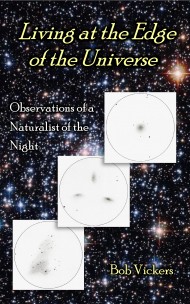As with most Abells it seems, Abell 2589 (GG&C #46) offered only a fraction of the total number in the cluster that were bright enough for me to see at all. I saw two out of the fifteen plotted galaxies, and both required extreme averted vision. Most of the remaining galaxies were very dim PGC (Principal Galaxies Catalog) galaxies. The brightest galaxy (NGC 7647) was only magnitude 14.6.
Abell 2593 (GG&C #47) was not much better at four visible galaxies out of thirty-two plotted. Again, all were visible only with averted vision. The largest and “brightest” galaxy of the bunch is NGC 7649 at mag 15.0.
I could see two of the four galaxies in Hickson 96, both with averted vision.
In Trio #48, I could see two of the three, one (NGC 7701) with direct vision. At mag 15.9, NGC 7699 was not visible. A very uneven trio.
Abell 2634 (also called the Pegasus II Cluster) is a good collection of small but fairly bright galaxies. It consists of a central clump of five brighter galaxies and a few more scattered dimmer ones.
When I observed Trio #50, I didn’t realize it at the time but I missed one of the trio galaxies (NGC 7781). Instead, I saw nearby NGC 7782 and sketched it instead. Sometime in the future I will try to come back and look for the “lost” galaxy. These are all fairly bright at mags 12.7 to 13.9.
Last, but not least, is Trio #1. It is a string of three fairly bright NGC galaxies, all roundish. Mags 13.1 – 13.7.


